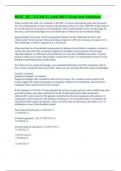Exam (elaborations)
BIOC 385 - EXAM 4 || with 100% Error-free Solutions.
- Course
- Institution
What would be the effect of a mutation in the HIV-1 reverse transcriptase gene that decreased the rate of mismatches? correct answers Any decrease in the error rate of HIVRT would result in an overall decrease in the rate of viral mutations. This would probably not be an advantage for the virus, as...
[Show more]



